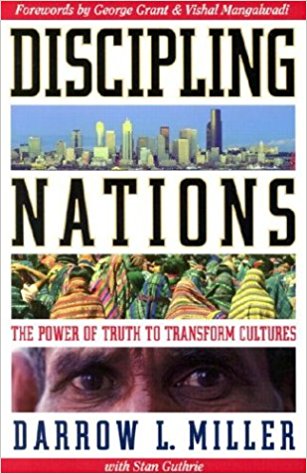Recently, a Christian brother published a “sympathetic critique” of Darrow’s book Discipling Nations. He raised issues about Disciple Nations Alliance teaching that have been noted by others from time to time. Because of that, and in the spirit of a free exchange of ideas, we offer here, in six parts, our brother’s critique and Darrow’s response. editor
~

A further investigation
When I first heard the title of Darrow Miller’s book, Discipling Nations: The Power of Truth to Transform Cultures (1998, 2001), something within me cringed. To me, “discipling nations” communicated theological and scriptural dissonance. I did not follow up on this sensation at the time, but my concern lingered. In November of last year I attended a conference where Miller was a featured speaker. He taught about discipling nations and I was troubled once again. I decided that it was, indeed, time to yield to my disquiet and investigate further.
After further reflection and study, I believe there are several weaknesses in his book and a serious conceptual flaw in his proposal. These should be acknowledged, investigated, and necessary adjustments implemented, for the sake of the church in [my nation] — despite all the positive elements of his message. (If you are a Miller enthusiast, I ask that you assume an open mind, while we think about the phrase “discipling nations” together.)
~
Thanks for taking the time to read and respond to my book. I so appreciate the carefulness and tone of your “sympathetic critique.” Your thoughtful review is worthy of careful response.
Let me say, too, that I have a heart for the church in your nation. It is not likely as dear to me as it is to you since you are living and investing your life in this wonderful nation. But, in fact, we at the Disciple Nations Alliance understand that the church is the Bride of Christ and has the responsibility of bringing the gospel to the nation. In fact, the local church is at the heart of the DNA ministry (as seen in our foundation document, Seven Transforming Truths).
The intersection of worldview and poverty
The book you have critiqued was first written 20 years ago, after 10 years of personal reflection on the relationship between worldview and poverty. In fact, my life has been lived out at the unlikely intersection of worldview and poverty.
I began my journey in the world of poverty in 1981, working for an evangelical international relief and development organization. At the time I was what might be called an evangelical socialist. I thought the root of poverty was lack of resources and the solution to poverty was the redistribution of resources. In my work I discovered that billions of dollars were being spent to help the poor, with very little commensurate return. It was a shock to me to come to understand that poverty was the result of lies stemming from non–biblical worldviews. Ten years of research, reflection and interaction with compassion workers around the world led me to write Discipling Nations.

Some of your critique is valid. This can be understood in that the book was originally written some 20 years ago. Obviously, as a serious, life-long learner, I have continued to study, read, dialogue and grow. Some of my previous insights have matured, some have shifted. We have now completed a more up-to-date edition of Discipling Nations that is likely to be out in Spanish (as well as English) in 2018.
Compassion and vision
According to the author, “Discipling Nations” provides a “wholistic framework” for ministry to “the poor and hungry,” as well as to “redeem culture and see nations discipled” (Preface, 2nd edition). His text is a manifesto for change and action. It is useful for laymen as an introduction to worldview, poverty, and development (though there are recent texts that are also helpful). He contrasts and critiques other perspectives from the biblical worldview. He urges Christians to “think independently, governed not by today’s current fad or trend but by reason” (109). He confronts the sacred-secular division, subjective spirituality, and anti-intellectualism prevalent among evangelicals today. He encourages Christians to “integrate their Judeo-Christian worldview into their professional lives” (107). All these features are very positive.
I do not know Darrow Miller personally. My impression is that he has great compassion and a broad vision. Friends who know him testify to his humility. He clearly has gifts of leadership and communication. He seems to be a pragmatic thinker, a man in search of solutions, particularly for poverty and development. Loren Cunningham (founder of Youth With A Mission) described Miller and his program in a way that reveals his priorities (27):
Darrow is not an intellectual; he is a Christian who is busy making a difference worldwide, and committed to seeing the minds of Christians renewed by God’s truth in order to more correctly and effectively reflect and initiate His truth into every realm of society, and thereby “disciple the nations”—which is the key to solving the world’s problems.
~
Thank you for the kind words you offer in the preface of your critique. My sense is that if we had time to meet, and I hope we will, we would find we have much in common and would likely become friends.
 A social activist, not an intellectual
A social activist, not an intellectual
Miller describes himself as a “social activist” (27) and Cunningham says that he is “not an intellectual.” Yet, his book deals with very important theoretical concepts, such as, the relationship between the church and the world, worldview, God’s purpose in creation, and the role of the intellect. This is significant, because in reality his study is very broad, but not very deep. Sometimes, it is quite simplistic, confusing, or reductionistic. I will provide several examples.
~
While I think in theological terms, I am not a trained theologian. As you have said, I am a social activist, one who has come to see the importance of ideas. The renowned Brazilian educator Paulo Freire noted two extremes: activism – doing without reflection, and intellectualism – reflecting without acting. While my inclination is to act, in my life and work I have sought to achieve a balance between action and reflection.
But although I am not trained as a theologian, I have sought to think deeply about my vocation from a biblical perspective. As you are aware, because of the sacred-secular divide, most Christians are Christians in their hearts but too often think like their culture thinks in terms of their work. My attempt, for over 30 years, has been to learn to think theologically about relief and development and the world of poverty.
So, it is with this in mind that I will seek to respond to the major points of your sympathetic critique.
- Darrow Miller







3 Comments
GUTEMBERG VIEIRA
February 26, 2018 - 9:17 amThe book is great!!!!
Jose Curiel
February 26, 2018 - 10:19 amGreat, wise response clothed in humility. Looking forward the other five.
cam
February 26, 2018 - 5:25 pmThe fact that there is a dialogue going on here makes this series worth paying attention to. An exchange like this seems to be a bit on the rare side these days. And it doesn’t really matter who we agree with – it is an opportunity to learn.